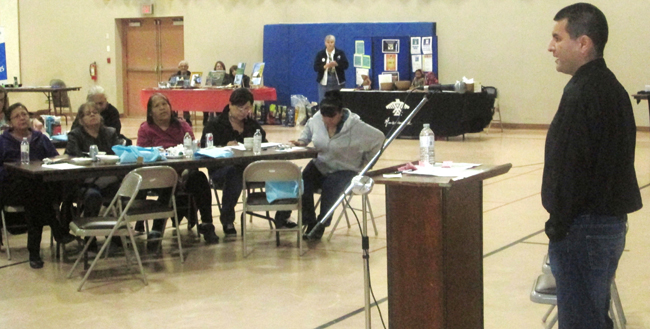‘I thought I was just a bad kid’

By Leslie Knibbs
MISSISSAUGA FN – Matt St. Clair thought he was “just a bad kid”.
Originally from Peter Ballantyne Cree First Nation in Saskatchewan, like many others with Fetal Alcohol Spectrum Disorder (FASD), he ended up in the Juvenile and Criminal Court System because of his adverse behaviours. Eventually he moved to Sault Ste. Marie and enrolled in a program in an effort to help himself lead a normal life.
He learned that, in order to do this, he had to literally start his life all over again.
Living a life “built on routines has helped me through my life and continues to do so,” he told participants Oct. 22 during the Fourth Annual FASD Conference in the Mississauga First Nation Recreation Complex.
Since completing the program, St. Clair has graduated from college, taken courses at Laurentian University and he now assists others with FASD as well as doing speaking engagements on dealing with FASD on a personal level.
“The key is early detection” when helping an affected individual, he says. ““I grew up tied to my culture, and, learned not to judge.”
St. Clair’s presentation was perhaps the most moving one heard by over 150 participants, who came from Batchewana First Nation north of Sault Ste. Marie to Sagamok Anishnawbek south of Massey.
The host community’s FASD coordinator, Priscilla Southwind, welcomed North Shore Tribal Council representatives to hear presentations from experts about the disorder and personal stories of affected individuals.
Melody Hawdon, a Dual Diagnosis Clinician working with the Canadian Mental Health Association, has developed a laminated “quick-glance” reference card for police and first responders, with tips about dealing with people diagnosed with FASD and mental disorders.
A justice caseworker with the Sault Community Court with 20 years experience maneuvering the justice system, Hawdon assists and counsels those with mental health problems when they find themselves before the courts. She has been instrumental in establishing the Community Court which meets every second Friday to deal exclusively with those suffering from mental disorders.
Rather than face the consequences of a criminal court, her clients, if they choose, may appear in Community Court. In most cases a six-month diversion program is ordered for those charged. Individuals suspected of having FASD or other mental disorders are often flagged by police and others working in the court system then referred to Community Court where more attention is given their disorder The Sault Community Court serves clients from Wawa to Elliot Lake, has two sitting Judges and Crown attorney educated on Mental Disorders including FASD.
All first responders in the Grey-Bruce Region have been provided copies of her reference cards, but Hawdon said she regretted that her records had only been subpoenaed by lawyers twice in six years to assist accused persons prior to sentencing.
Dr. Ken Boss, a psychiatrist with the North Bay Regional Health Centre, spoke about the urgent need for early FASD diagnosis.
“Engaging in adverse behaviour increases if a diagnosis is done after age 12.”


